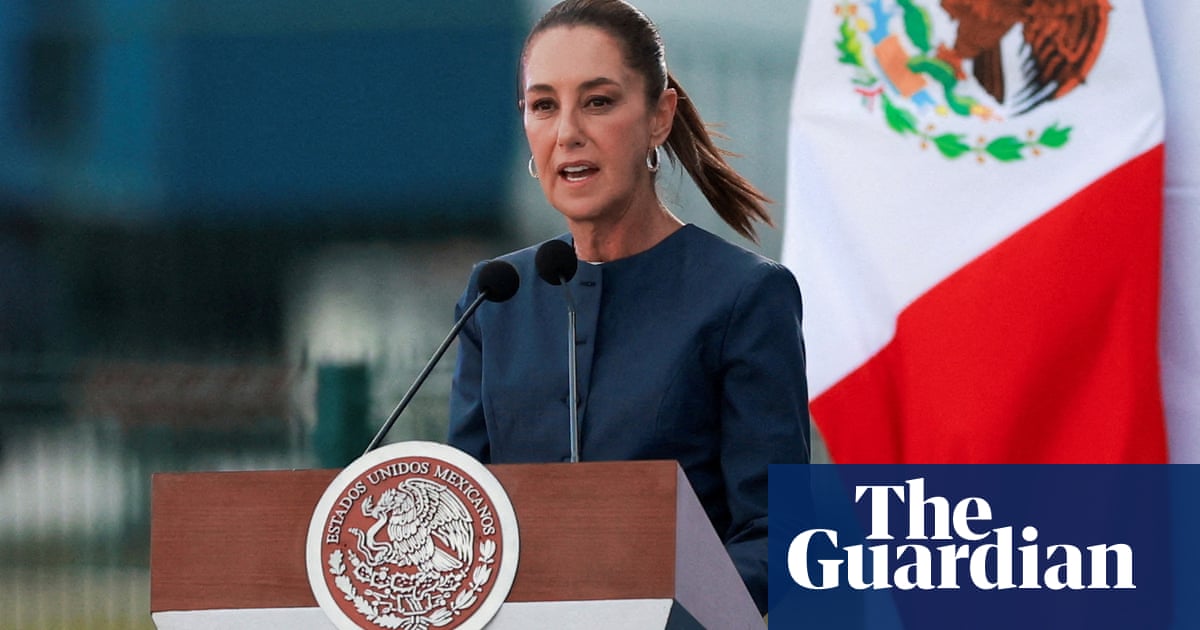A sharp exchange of statements over the weekend has heightened concerns inMexicothat Donald Trump may push for a US military presence in its territory to fight drug trafficking.
The Mexican president,Claudia Sheinbaum, sought to defuse the situation in her daily press conference on Monday, emphasising that communication between the two leaders had been “very good” so far.
But the episode underlinedthe fraught path that Sheinbaum is navigating, as she attempts to placate Trump and protect the US-Mexico trade relationship while also defending Mexican sovereignty.
On Saturday, Sheinbaum revealed she had rejected an offer from Trump during a call last week to send US troops intoMexicoto help fight drug trafficking.
“I told him, ‘No, President Trump, our territory is inviolable, our sovereignty is inviolable,’” said Sheinbaum, adding that while the two countries can collaborate, “we will never accept the presence of the US army in our territory”.
Trump on Sunday confirmed he had made the offer to Sheinbaum, because the cartels “are horrible people that have been killing people left and right and have been – they’ve made a fortune on selling drugs and destroying our people”.
“The president of Mexico is a lovely woman, but she is so afraid of the cartels that she can’t even think straight,” added Trump.
Despite the exchange over the weekend, the public relationship between Trump and Sheinbaum has been largely cordial, with manycomparing Sheinbaum’s performance favourablyagainst other world leaders who have clashed with the US president.
The US-Mexico relationship is complex and vastly important for both countries, spanning trade, migration and security.
Since returning to power in January, Trump has imposed various tariff schemes that have jeopardised the free trade agreement between the two countries and the near trillion dollars of trade a year that passes between them.
Trump directly linked some of those tariffs to reducing the movement of undocumented migrants and fentanyl across the border into the US, and Sheinbaum’s cabinet has been engaged in intense diplomatic efforts to persuade him to withdraw them.
Sheinbaum first sent 10,000 additional troops to the border, then Mexico sent 29high-level organised crime operativesto face justice in the US, including Rafael Caro Quintero, the drug lord who was convicted of the murder of an undercover US Drug Enforcement Administration agent in 1985.
Meanwhile Sheinbaum has abandoned the hands-off security strategy of her predecessor and ally, Andrés Manuel López Obrador, and ramped up direct confrontation of organised crime groups, withsoaring arrests and seizuresof drugs and guns.
“Trump has created a real pressure that’s forced Mexico to act,” said Will Freeman from the Council on Foreign Relations, a US-based thinktank. “I think Sheinbaum wants to act anyway, but it’s made her job easier by putting this pressure behind her.
“I think Trump’s vision is that this is almost like an insurgency in Mexico,” added Freeman. “And if the Mexican military is not willing to fight it – and they do often seem to be less than willing to use their full force against the cartels – then the US should do it.”
But experts say it is unclear that greater military action would fundamentally address the problem of organised crime in Mexico.
“I think to really change the balance of power between organised crime and the state in Mexico, you need intelligence, you need accountability through the justice system, you need political will,” said Freeman.
Still, Trump has said that the US could use unilateral military action if Mexico does not do enough to dismantle the cartels.
Sheinbaum has warned that her countrywould not toleratean “invasion” of its national sovereignty by US forces.
“But the Mexican government should not just assume that [unilateral military action] couldn’t happen, regardless of how bad an idea it would be on many levels,” said Cecilia Farfán-Méndez, from the Global Initiative against Transnational Organised Crime, an NGO. “All scenarios should be planned for.”
